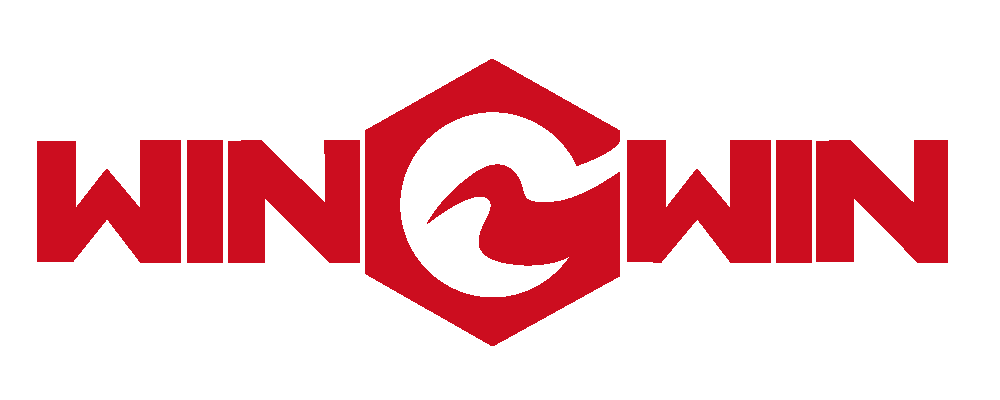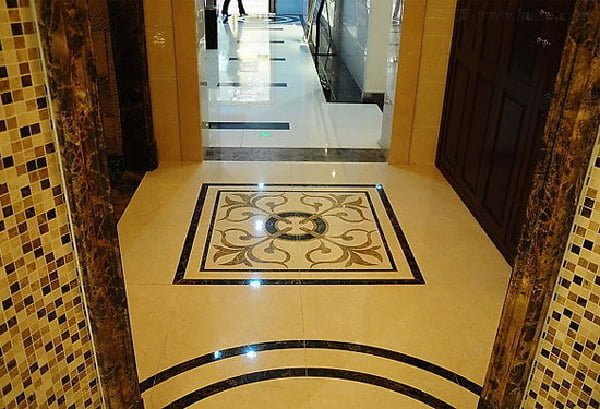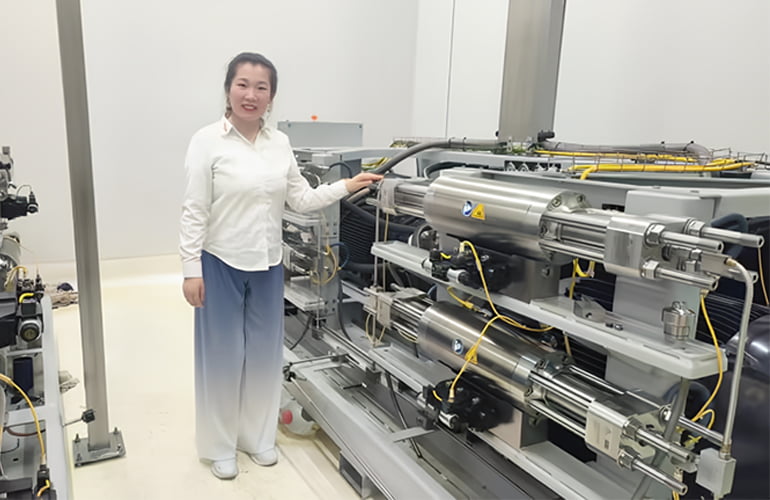Content
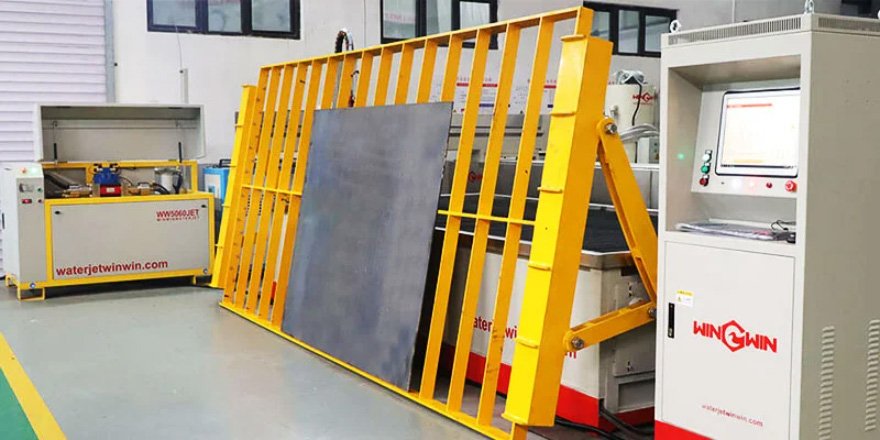
If you are in the market for a water jet cutting machine and don’t know much about the price of these machines, you can get some useful information by reading this article. In the following part, we will introduce the water jet machine prices and the costs incurred in the operation process. We hope it will guide you to a machine that meets your needs.
I. Which is better laser cutting or water jet or plasma?
When it comes to cutting accuracy, waterjet cutting is considered the most precise due to minimal heat distortion. Following closely behind is laser cutting, but it’s important to note that laser cutting can cause distortion on thicker materials. Plasma cutting comes in third in terms of accuracy.
Regardless of the cutting method, precision is essential for achieving high-quality manufacturing results. Therefore, choosing the right cutting method, whether it’s plasma, laser, or waterjet, is crucial for achieving accurate and high-quality cuts.
II. How much does a waterjet cost vs laser?
When it comes to the initial cost of purchasing cutting machines, there is a notable difference between laser and waterjet options. Laser cutting machines typically range from $8,000 to $250,000, depending on the brand and features. In contrast, water jet cutting machine prices can range from $60,000 to $450,000.
While the upfront cost of a waterjet cutter may seem higher, its unique benefits and ability to cut through a wider range of materials make it a valuable investment for businesses.
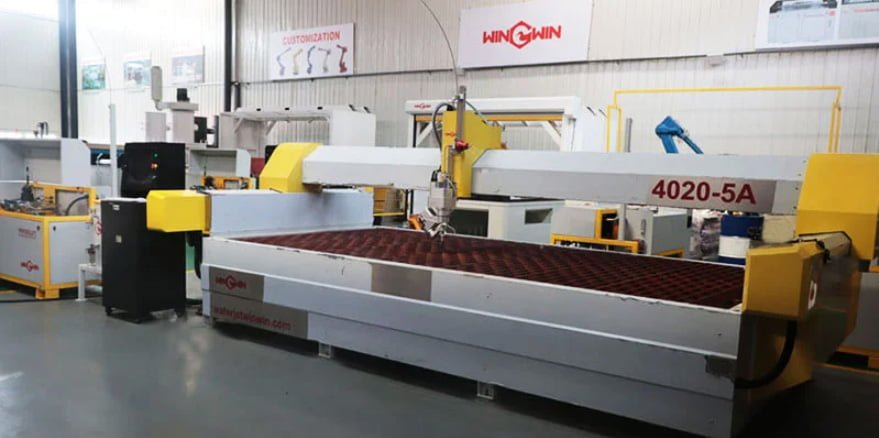
III. How much does a waterjet machine cost?
To maximize your investment, we suggest opting for waterjet cutters starting at $100,000. For those with a more flexible budget, there are high-end models available that can cost up to $450,000. By choosing a waterjet cutter, you can take advantage of its unique benefits and achieve high-quality cuts, making it a worthwhile investment for businesses of all sizes.
IV. What is the average cost of water jet cutting?
When estimating the water jet machine price and cost of a waterjet cutting project, it’s essential to consider four key factors. These include:
1. Material Types
Different materials have varying cutting times, and the information on the time taken to cut per inch of a particular material will be provided by the waterjet machine manufacturer. You can use this information to evaluate the time taken to cut through a specific material.
2. Material Thickness
The cutting time required for waterjet cutting is directly related to the thickness of the material being cut. For instance, if you’re cutting a two-inch thick material, it will take twice as long to cut as a one-inch thick material of the same hardness.
3. Final Cut Dimensions
The final dimensions of the cut that needs to be achieved should be taken into account. By adding the total length and width of the cut materials, the total inches that require cutting can be calculated. The time taken to cut per inch can then be multiplied by the total length to determine the total cost.
4. Quality of Cut
The desired quality of cut should also be considered when estimating water jet cutting machine price. Higher quality cuts require a slower cutting process, which can increase the overall cost. However, if high-quality cuts are not required, the cutting speed can be increased to save on costs.
On average, the cost of waterjet cutting per hour ranges from $12 to $30, but this can vary depending on specific project requirements. To provide a better understanding of the hourly cost breakup of a waterjet machine, consider the following example scenarios:
- Cutting soft materials such as foam or rubber with a pure-waterjet cutting process may cost around $12 per hour due to lower abrasive usage and shorter cutting times.
- Cutting harder materials such as metal or stone with an abrasive waterjet cutting process may cost around $20 to $30 per hour due to higher abrasive usage and longer cutting times.
- Cutting high-quality, intricate designs may require a slower cutting process and multiple passes, resulting in a higher hourly cost of around $30 or more.
In summary, it’s important to consider these factors when estimating the water jet machine price and cost of a project. By doing so, you can make informed decisions and achieve the desired quality of cuts while keeping costs under control.
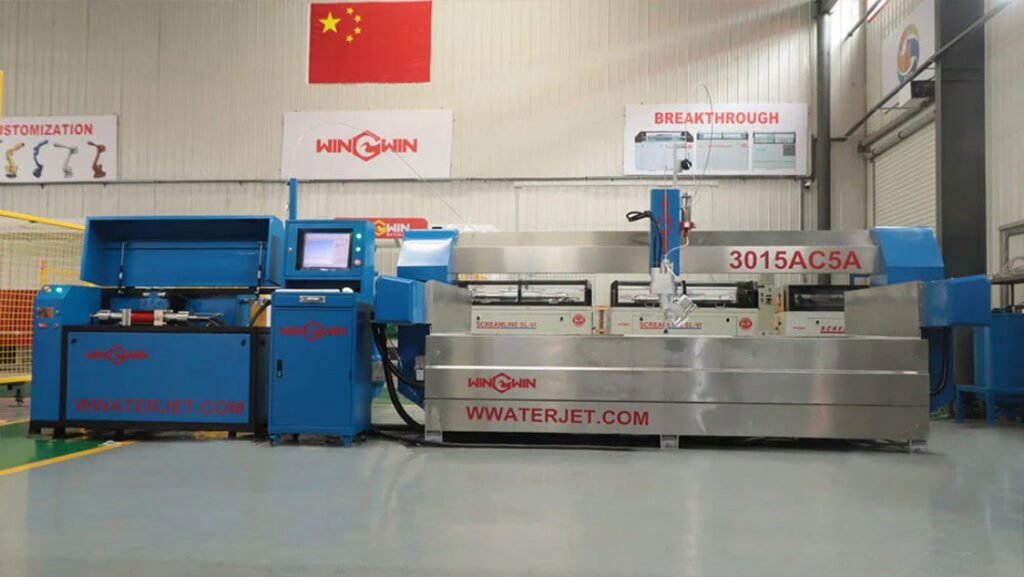
V. Is waterjet cutting expensive?
When considering the water jet cutting machine price, it’s important to factor in its various applications and unique benefits. While the hourly rate of waterjet cutting may seem higher than other cutting alternatives, it’s important to remember the advantages that make it the superior cutting process.
Waterjet cutting is a cold cutting process that can cut through the material without damaging its quality. Additionally, stacking multiple layers of bulk materials to create multiple cuts is possible with waterjet cutting, which is not achievable with other cutting techniques.
While there are costs associated with waterjet cutting, it is still a cost-effective cutting option. While the initial investment may be higher, the long-term cost savings and high-quality cuts make it a worthwhile investment for you looking to maximize their cutting efficiency.
VI. Why are water jet cutters so expensive?
When considering the cost of owning and operating a waterjet cutting machine, it’s important to look beyond the initial purchase price. There are several factors that can contribute to the overall expense, including consumable materials such as water, fuel, and abrasive materials.
The pressure level needed to cut through thicker materials also significantly increases the cost, as it requires more power and time to complete the job. Therefore, it’s necessary for you to consider all of these factors when estimating the cost of a waterjet cutting project, as they can all contribute to the final cost.
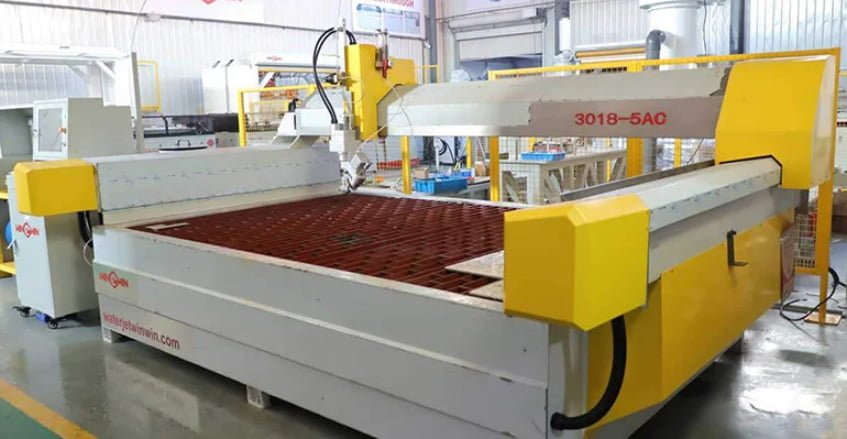
VII. What are the factors affecting the operating costs of waterjet cutting?
When you estimate the cost of abrasive waterjet cutting, there are several factors to consider. These factors include:
1. Water Consumption
Although water is a crucial component of waterjet cutting, it doesn’t significantly impact the overall cost. The cost of water is relatively low, averaging about $3 per 1000 gallons.
2. Electricity Consumption
The cost of electricity can contribute significantly to the overall cost of waterjet cutting per hour. The exact cost of electricity will vary depending on the machine and the cost per KW in your area, but it can range from $3000 to $9000 per year for machines running six hours a day (2000-2100 hours per year).
3. Wear of Parts
Regular wear and tear of machine parts such as nozzles and pump seals is expected, and it’s important to consider the cost of replacing these parts when estimating the overall cost of waterjet cutting.
| Part Name | Approximate Cost | Approximate Lifespan |
| Orifice | $15 | 40 hours |
| Nozzles | $80 | 80 hours |
| Mixing Chamber | $150 | 400 hours |
| High-Pressure Pump Seal | $120 | 500-1000 hours |
4. Cost of Abrasive
Abrasive material, typically garnet, is a significant contributor to the overall cost of abrasive waterjet cutting. Garnet abrasive, which is commonly used in the cutting process, typically costs around 25 cents per pound. The cost of abrasive material is ground on the type and quality of abrasive used.
5. Quality and Type of Waterjet Cutters
The quality and type of waterjet cutter used can impact the overall cost of waterjet cutting. While high-end waterjet cutters come with a higher initial investment, they may save money on running costs in the long run. Pure-waterjet cutting is cheaper because it doesn’t require the use of abrasive materials. But it is only fit for cutting soft materials such as rubber and foam.
6. Cutting Time
The longer it takes to cut a material, the more resources the cutter will use, which can increase the overall cost of cutting.
7. Garnet Flow Rate
The flow rate of garnet or abrasive material is crucial to consider when estimating the cost of waterjet cutting. For example, cutting metal plates typically requires the use of garnet abrasive, which can cost between $18 to $36 per hour of cutting time.
8. Programming and Data Input
Efficient programming and data input can ensure that cuts occur in the most effective manner, reducing unnecessary processes and ultimately lowering costs.
By understanding the factors that impact the cost of the process, you can make informed decisions about your cutting needs and ensure that you get the best results at a fair price.
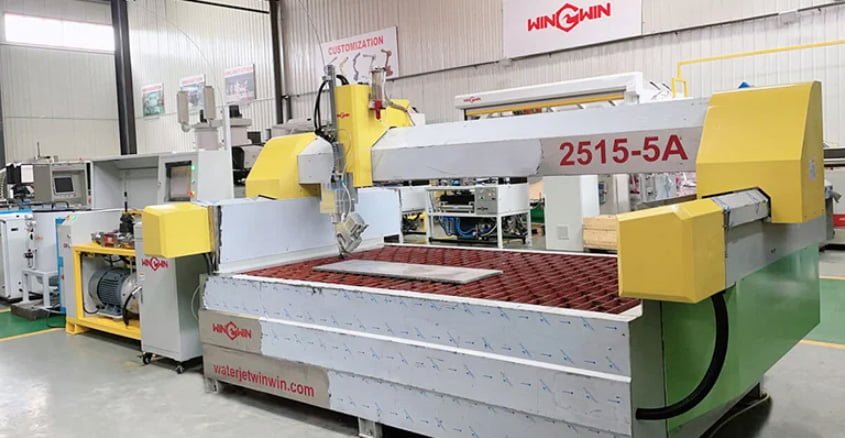
VIII. How long does a water jet last?
On average, most water jet pumps will last between 10 to 15 years, providing reliable performance during that time. However, there are some pumps that can last for 20 years or more, depending on how well they are maintained and the quality of their components.
The longevity of a jet pump largely depends on factors such as the quality of the pump, the frequency of use, and the maintenance it receives. Regular maintenance can help prolong the lifespan of a jet pump and ensure it continues to operate at optimal performance levels. Ultimately, the lifespan of a jet pump can vary, but with proper care and maintenance, it can provide reliable service for many years.
IX. Examples of water jet cutting machine prices for different industry applications
Water Jet Tile Cutting Machine Price
The CNC water jet tile cutting machine price can vary significantly based on the components used. These machines require an ultra-high-pressure intensifier pump, which can be quite expensive. Typically, the price range for these machines falls between $40,000 to $100,000, depending on the size and options selected. Customized machines can be even more expensive than entry-level models, but the cost ultimately depends on your specific needs and preferences.
Water Jet Stone Cutting Machine Price
The water jet stone cutting machine price is determined by their type, model, and brand. Typically, an entry-level water jet machine price is around $30,000 to $40,000, while larger, more advanced models can cost over $100,000. The price range is influenced by a variety of factors, such as the machine’s size, capabilities, and level of sophistication. It is important to consider these features when purchasing a water jet stone cutting machine to ensure that you get the best value for your investment.
Water Jet Metal Cutting Machine Price
The water jet metal cutting machine price can vary depending on the type, model, and brand, as well as the cutting capabilities and precision of the machine. Generally, an entry-level water jet metal cutting machine price can range from $40,000 to $60,000, while larger, more advanced models can cost upwards of $200,000. The price is influenced by various factors, such as the size, cutting abilities, and accuracy of the machine’s components, including the pump, cutting head, and software.
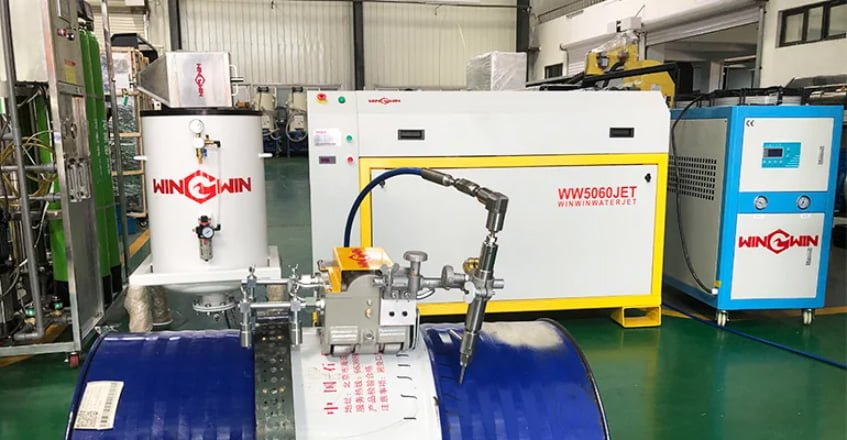
X. Conclusion
In short, water jet cutting machine price depends on a variety of factors. If you want to buy a water jet cutting machine, more knowledge is very necessary.
Smaller entry-level machines tend to be cheaper, while larger high-end machines have more advanced features and therefore cost more. High quality water jet cutting machines offer significant advantages in terms of productivity, efficiency and long term cost savings. The final price to pay for the machine will depend on your specific requirements, such as the type of material to be cut, the level of precision required, and the amount of work to be done.
By carefully considering these factors, you can find the right water jet cutting machine that meets your needs and is within your budget. We hope this guide will give you a better idea of water jet machine prices and help you get the best value for money.
